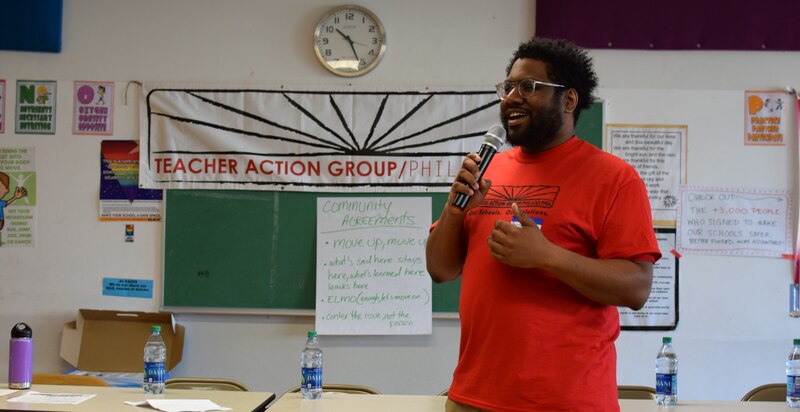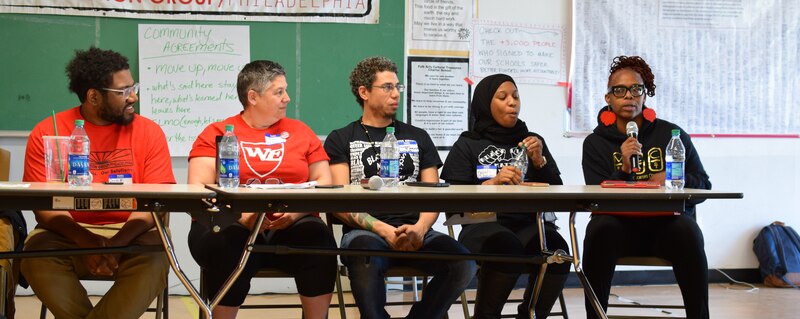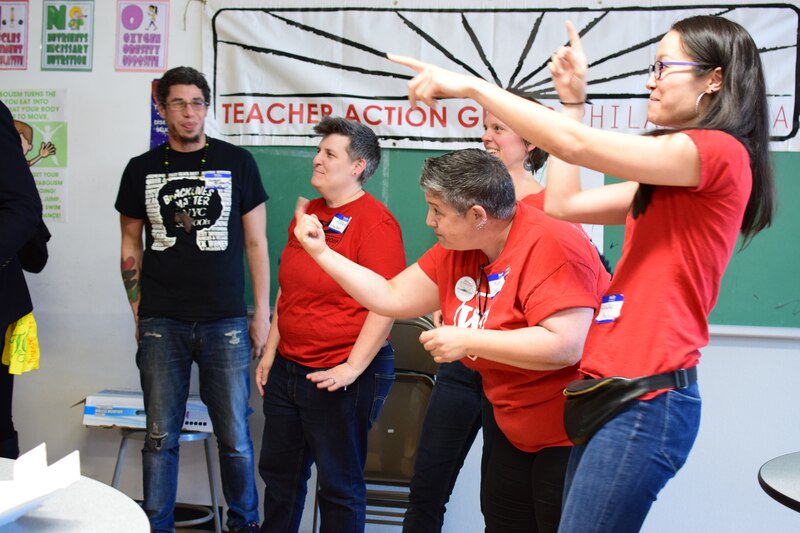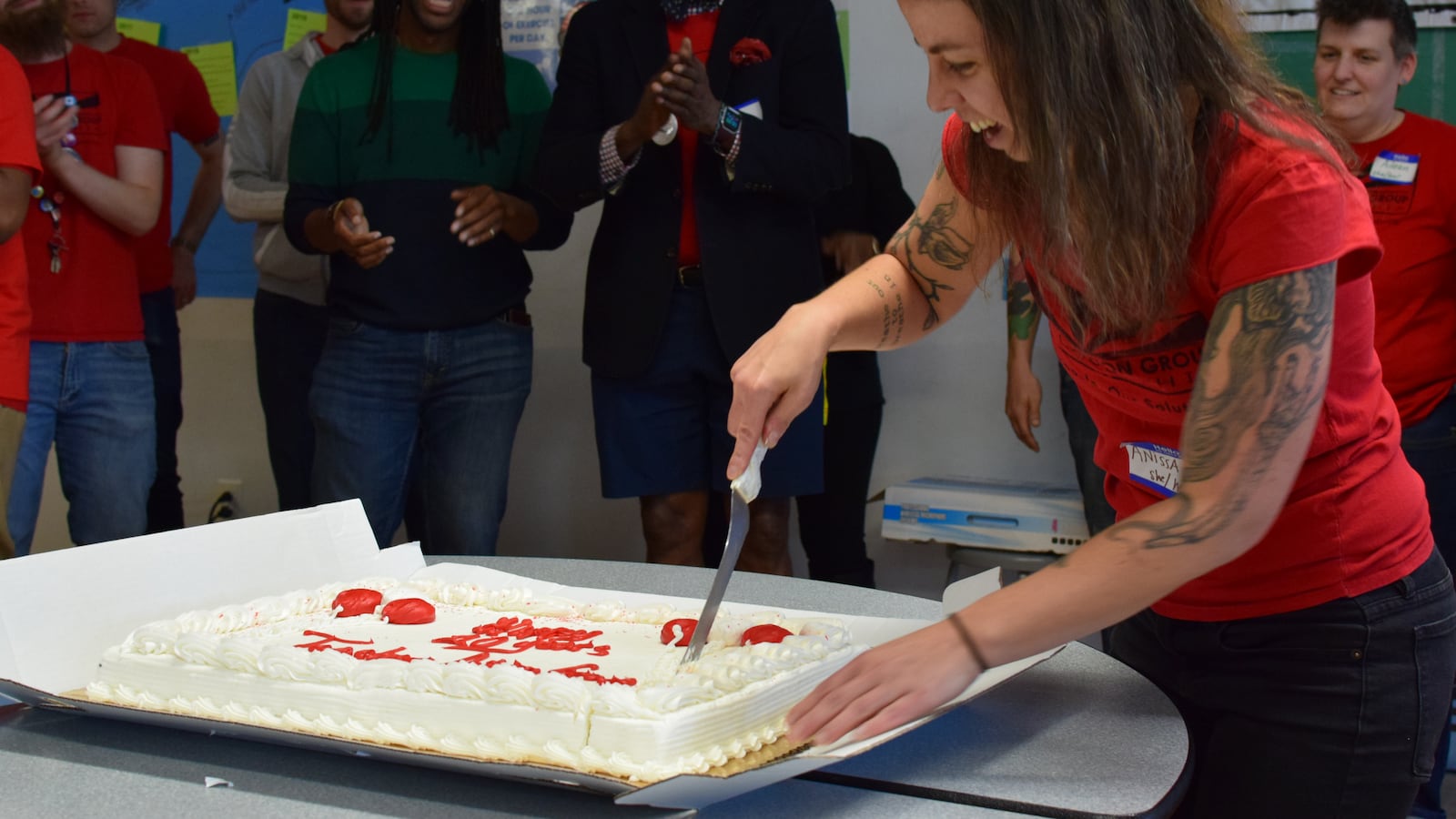This article was originally published in The Notebook. In August 2020, The Notebook became Chalkbeat Philadelphia.
Educators gathered Saturday, April 27, to celebrate the 10th birthday of the Teacher Action Group (TAG), bringing cake and dancing to its annual Education for Liberation conference.
Held at the Folk Arts-Cultural Treasures (FACTS) Charter School in Chinatown, the day began with a panel of educator-activists talking about the history of the group and the various projects it has helped found.
Anissa Weinraub, a TAG co-founder, said the group was started as a response to educational injustice.
“We were dealing with our racist state government that had been shortchanging our public schools for decades,” said Weinraub, a veteran city teacher who now runs the Academy at Palumbo’s theater program. “And we were under the No Child Left Behind regime … where high-stakes standardized testing was used to sort and label our schools as failures and blame our ‘underachievement’ on our schools, even though we were incredibly under-resourced.”
At the time, the old School Reform Commission was still in charge of the School District, the result of a state takeover.
Weinraub saw a lot of outrage from teachers, but not enough action. In 2009, she attended a teach-in put on by the Philadelphia Student Union.
“It was really profound,” she said. “They said, ‘Here is the plan. There are going to be big franchise corporate charter companies coming in here to take over schools.’ … Public schools were becoming the front line for capitalist expansion.”
“I looked around and asked, ‘What are teachers doing?'” She said she felt the Philadelphia Federation of Teachers, wasn’t doing enough.
So Weinraub emulated the example set by students.
“A few of us [teachers] got together and laid out what we believed in,” she said, naming restorative justice, community control of schools, and a culturally inclusive curriculum, among others. From there, she reached out to the national network called Teacher Activist Groups, which liked the platform and invited the Philly teachers to join.
Weinraub said she consulted with Erika Almirón, who was then the assistant director of Philadelphia Student Union and is currently running for City Council.
“She helped me understand that TAG’s work should not be about leading one campaign. It was about developing a network of leaders who understand how white supremacy and capitalism are affecting our schools,” Weinraub said. “Creating this space where classroom teachers understand that our work doesn’t end in the classroom.”
A year later, in 2010, TAG began organizing around the lack of funding for school libraries, social studies programs, and world languages.
Hanako Franz, a teacher at Paul Robeson High School and another founding member of TAG, said she took a job at Olney Charter High School after the District turned over the neighborhood school to ASPIRA in 2011 as part of the Renaissance charter school initiative. She had finished student teaching and wanted a job at a District-run school, but the District had a hiring freeze, so she applied to charters.
Olney was one of 18 schools that the District identified for turnaround. Many of them were turned over to charter operators — typically, established “franchise” operators such as Mastery, ASPIRA, and Universal Companies.
“That involved the force-transferring of over 1,000 school staff, forcing them out of the union,” Franz said. “Usually, there’s a shallow attempt to get community input, but some did not even try.”
Audenried High School in South Philadelphia was handed over to Universal Companies just three years after the School District spent $3 million building a brand-new facility for the school.
“This typified the plan [that the Student Union was talking about] – taking public money and handing it over to private companies,” Franz said. “Many students were walking out and protesting.”
Franz recounted the story of Hope Moffett, an Audenried teacher who was an outspoken opponent of converting her school to a charter. She encouraged students to oppose the move.
“Hope Moffett was targeted because she gave tokens to students to attend these protests,” Franz said. Ultimately she was sent to “the rubber room,” also known as “teacher jail,” where teachers sit in the central office building unable to teach their classes. “I said, ‘We need to put the call out to teachers and we need to protest.’”
So TAG got involved and organized a demonstration outside District headquarters. Franz said that the administrator who wrote Moffett up was then sent to tour Franz’s school the morning of the protest, visiting teachers’ classrooms. Franz felt she was “clearly trying to intimidate us.”
“It was a moment where we saw that teachers were hungry for space to educate outside of the classroom,” Franz said. “We need to be organizing people across our city if we want to have the kind of education that our students deserve.”
In the end, the District reinstated Moffett after the PFT filed a First Amendment lawsuit.
Chris Rogers joined TAG in 2013 when he came to Philadelphia to attend graduate school at the University of Pennsylvania. At Penn, he heard about TAG’s Inquiry to Action Groups. Educators meet to research certain topics that they say public education should confront more directly, to identify goals for improvement, and to organize around those goals.
The groups change each year; many of them build on the work done by a prior year’s group. This year, TAG is running five Inquiry to Action Groups; topics include the impact of gentrification on students and building a culture that actively teaches consent as a way to resist rape culture.

Chris Rogers, who joined TAG in 2013, speaks at the 10th-anniversary event. (Photo: Greg Windle)
In 2012, the Chicago teachers’ union held a successful strike, inspiring TAG to reach out to that union and learn from their organizing experience – a relationship that lasts to this day.
Kelley Collings told a story similar to many others on the panel: She watched the work of TAG from a distance, wanting to be involved, but never felt that she had the time. She did join in 2010, and she organized teachers after dramatic state and federal education funding cuts under Republican Gov. Tom Corbett hit the Philadelphia School District hard. The District closed 24 schools, displacing more than 6,000 students, and laid off nurses, counselors and other support staff at remaining schools.
TAG’s protest and outreach campaign called Faces of the Layoffs asked the state and city to provide the funding needed to rehire support staff.
Collings, who now teaches at Feltonville School of Arts & Sciences, was a community organizer before becoming a teacher. She used that experience to help organize her colleagues. And that organizing went into an Inquiry to Action Group, which formed the Working Educators (WE) Caucus in 2014. By 2016, WE ran a slate of candidates against the current PFT leadership.
The Working Educators ran on a platform that promised to organize around equitable funding for education and a willingness to protest in the streets. They lost, but plan to run another slate next year.
“After Chicago launched their caucus [the Caucus of Rank and File Educators], they challenged their union leadership and took the reins of the great Chicago Teachers Union,” Collings said. “They started bringing like-minded folks together from across the country at these gatherings.”
At first, Collings and her colleagues at TAG met “regularly” with PFT leadership, “trying to push the [union] to use its mighty resources to wage grassroots campaigns around school funding and school closures.”
“Every single time we took an organizing proposal to the leadership, there was a wet blanket thrown over it,” she said. “Finally we said ‘enough is enough’ and turned to our friends in Chicago to help us build a caucus.”
After members of the Chicago caucus came to Philadelphia, 27 TAG members formed the WE caucus and became its first members. At that point, TAG let the caucus take the lead on organizing and activism about issues that specifically affect the PFT. Now TAG works on more expansive projects and includes members from outside the union — preschool teachers, college professors, and professional development staff.
Although the WE Caucus is independent of TAG, some of TAG’s work still gets spun off into the caucus. In 2015, an Inquiry to Action Group called Fighting Racism from Within decided to form what is now called the Racial Justice Committee of the WE caucus. That committee now organizes an annual Black Lives Matter Week of Action in schools.
Another inquiry group from 2015 – Hip-Hop: the Good, the Bad and the Ugly – led to the formation of a 2016 group that sought to redesign the African American history curriculum. And that led to the founding of the Philadelphia Black History Collaborative, which has created a curriculum focusing on grassroots actions by the black community over the last 50 years.

(From left) Chris Rogers, Kelley Collings, Ismael Jimenez, Keziah Ridgeway, and Angela Crawford. (Photo: Greg Windle)
Ismael Jimenez, involved in the racial justice work of both TAG and the WE caucus, had a story similar to Collings’. He admired TAG’s work, but with several kids at home, he couldn’t commit. Then the District closed Germantown High School in 2013. Jimenez was out of a job.
“That devastated me,” Jimenez said. He was hired to teach history at Kensington Creative & Performing Arts High School, where he ran into an old friend from graduate school, Yaasiyn Muhammad. The two went on to be candidates for PFT offices on the Working Educators’ slate. But it began smaller than that.
They went to an Inquiry to Action Group, Black Music and Rebellion, where they discussed creating a black history curriculum that taught the role of music in black social movements.
“I thought we need to have this specifically on hip-hop because it’s so relevant to our current context if we can actually teach teachers to use it in their classrooms,” Jimenez said. “So next year, I got permission from my wife, even though my fourth one was on the way.”
Later Jimenez started a book club for teachers reading The New Jim Crow, Michelle Alexander’s book about how mass incarceration and the bipartisan policies that create contemporary prisons and policing are just the most recent manifestation of white supremacy.
Jimenez and Muhammad co-founded the Philadelphia Black History Collaborative, which has created a black history curriculum focusing on the last 50 years.
“I was brought into the caucus, and I felt I was in the right place at the right time,” Jimenez said. “I felt the love.”
(In 2005, before the WE Caucus was organized, Philadelphia became the first major city in the United States to require an African American History course for graduation.)
Keziah Ridgeway, a history teacher at Northeast High School, said she’s most enthusiastic about Black Lives Matter Week of Action. She first encountered her inspiration for working on a racial justice curriculum as a student teacher. Ridgeway saw a young white woman teaching a class of black students a unit centered on the book and documentary Guns, Germs and Steel: The Fates of Human Societies, by Jared Diamond. Their teacher asked them, “Do you think Africa should have been colonized by Europeans?”
“The first kid said, ‘Yeah, it definitely needed to be colonized, because Europe brought hospitals and universities and roads,’” Ridgeway said. “And I thought, ‘Oh no!’”
Ridgeway, concerned about successfully completing her student teaching requirement, said nothing. “I’ve been mad at myself ever since,” she said. “So I take my anger and push it into my work.”
Video of the full panel, by Nick Palazzolo:

Teachers dance to “Happy Birthday,” as Kelley Collings beckons Anissa Weinraub to cut the cake. (Photo: Greg Windle)


